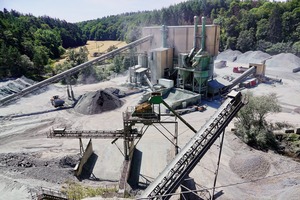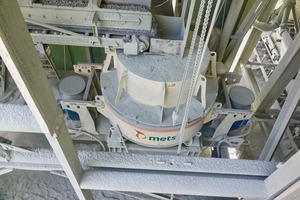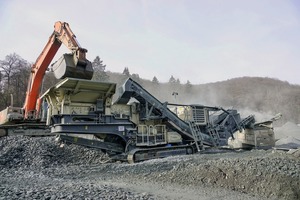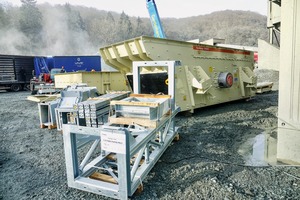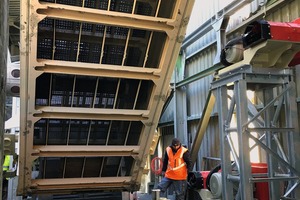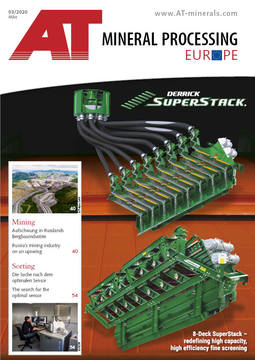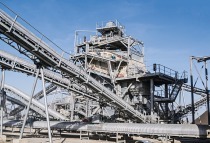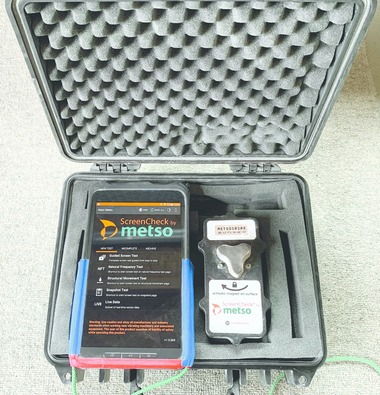Diabas plant in Taunus eliminates machine bottleneck
As early as 2016, the company management has already considered a new building or alternatively a gradual partial renewal of the processing plant at the diabas quarry in Altenkirchen. Large parts of the plant have already been in operation since 1994 and recently reached the end of their economic life. In view of the threat of a production stoppage and the limited space available, a gradual partial renewal of the old plant was considered in 2018 and the company entered into the planning process together with Metso Germany – a typical SiteBoosterTM plant optimization project.
In addition to the renewal of the machines, a further objective was to eliminate the bottleneck in the production of high-grade chippings in order to be able to expand the capacities of the fractions 5/8, 8/11, 11/16 and 16/22 mm, which are particularly in demand, in a future-proof manner. “We are convinced that in future the market will demand even larger quantities of high-quality fine chippings from the market, while recycled products will be much less in demand,” explains Managing Director Bernd Jost.
In 2018, Metso was awarded the contract for the detailed planning and implementation of the conversion of the precious grit production facility. The contract included the planning, delivery and installation of 3 screening machines and a vertical impact mill.
The expansion of the capacity of the high-grade chipping plant, taking into account the limited space available, could only be achieved with machines from the broad Metso portfolio, which exactly met the specified dimensions. In addition, the statics for all plant components had to be recalculated and revised in places.
The first replacement machine was a single deck screening plant which screens out mainly frost protection material from the feed material 0 – 150 mm. The separation cut of the new GFA screen type Metso 1P 6000/2000 is 45 mm. The underflow of this screening stage is stockpiled as sales product or enters the high-grade chippings production via a Metso HP100 secondary crusher. The oversize particles (45/x) are passed through the 3rd and 4th crushing stage into the fine chippings screening.
The Metso ES203, a triple-deck elliptical vibrator with ample space between decks, is used as an exchange machine for processing the material in the fine chippings screening unit. The material is separated into 8, 22 and 32 mm fractions over a screening area of 9 m² each. While wire cloth is used in the lower deck, the decks above are equipped with rubber screen decks of the Trellex LS RU type.
In the third screening stage, a Metso CVB202 screen will be used to classify the 8/11, 11/16 and 16/22 mm chippings fractions. This double-deck screening machine has a screening area similar to that of the ES203 and is also equipped with the rubber screen Trellex LS RU and on the last meter with wire mesh. Thanks to the modular design, it was possible to find a suitable circular vibratory screen from the CVB series for the required screening area and the limited space available.
In order to realise the planned capacity increase in the production of high-grade chippings, it was essential to find a more powerful vertical impact crusher in addition to the use of more productive screening machines. The choice fell on the Metso Barmac B7150SE, which can process up to 545 t/h depending on settings and feed material. It now takes over the role of cubicle crusher in the 4th crushing stage and with its high output removes the bottleneck that previously existed. The material is first crushed down from 45/x mm to 0/32 mm via the upstream Metso HP3 cone crusher in the tertiary stage and further processed via the new Barmac.
Due to the more powerful machines, much higher loads will be transferred to the existing steel structure in the future - this was initially considered a challenge for the statics. The new elliptical screening machine of the type Metso ES203 could therefore only be commissioned after the installation of reinforcements. The dead weight of this screening machine alone is already twice as high as that of its predecessor. Thanks to professional preparation during the measurement and the faultless static calculations, all machines could be used with a perfect fit right from the start.
All in all, the planning and installation phase of the SiteBoosterTM project went smoothly and the conversion was completed within the specified time frame of 8 weeks, which included commissioning. “Apart from the adjustment of individual screen linings and settings of the mass flow rates in the Barmac, which is completely normal, there were no unpleasant surprises”, Bernd Jost expressed his satisfaction. During the rebuild phase, the company used another LT1213S mobile rental impact crusher in addition to its own, as well as two mobile screening plants for rent through Metso dealer Fischer-Jung to keep production going. Metso Germany was the contractual and contact partner for Jost, while the sister company Metso France from Macon was responsible for planning, material supply and assembly/commissioning.

